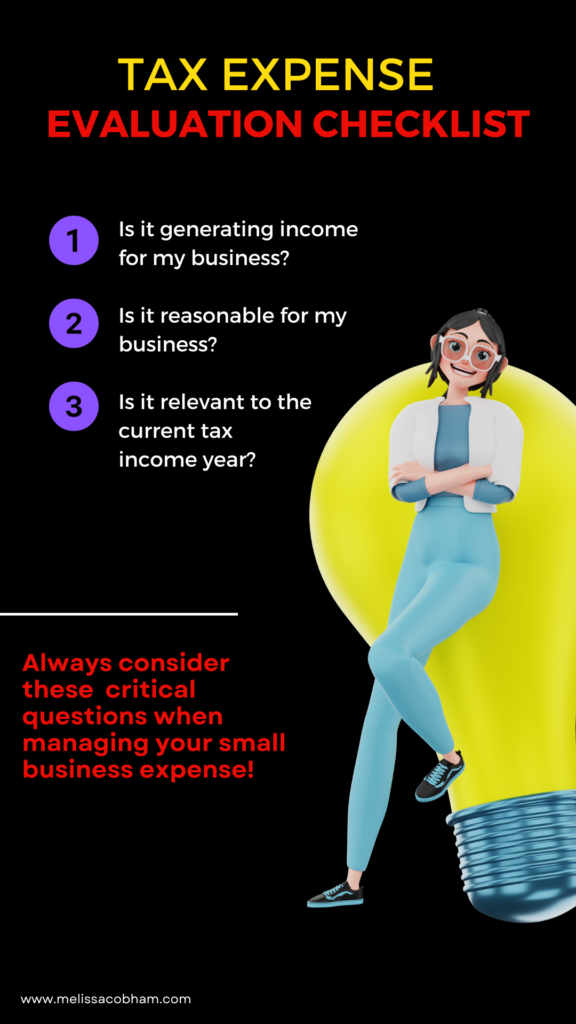I understand that this topic can be somewhat dry and technical, so I’m going to attempt to break it down in a way that’s easy to grasp.
You’re a small business owner, and I’m sure you have heard that you can claim all your expenses to reduce your tax bill, and you’re excited about the prospect of saving some money back.
I hate to break it to you, but it’s crucial to clear up a common misunderstanding: Not all your expenses are eligible for tax deductions. With less than eight weeks remaining until we step into 2024, which also signifies the close of the 2023 tax year, it’s time to get ready. You should be making your last quarter installment for 2023, due by December 31, and gearing up for your final payment and tax return in April 2024.
To begin with let’s state the facts. Section 10 of the Trinidad and Tobago Income Tax Act states:
“In computing the income of any person for a year of income from any source specified in section 5 for the purpose of ascertaining the chargeable income of a person for that year, there shall be allowed to that person all outgoings and expenses wholly and exclusively incurred during the year of income by that person in the production of the income from that source.”
The first part of this clause, “In computing the income of any person for a year of income from any source specified in section 5 for the purpose of ascertaining the chargeable income of a person for that year,” might seem like a mouthful, but here’s the deal: firstly it applies not only to individuals but also to businesses and companies, meaning regardless if you are a sole proprietor or not it applies to you.
When we’re discussing income in a business context, we’re talking about the gains or profits that a business earns from its revenue generating activities including trade of products and services, and other business activities. On the flip side, chargeable income represents the bottom line – it’s what’s left after we deduct all eligible expenses, deductions, and exemptions from your total income.
The essence of the second part of the clause, “there shall be allowed to that person all outgoings and expenses wholly and exclusively incurred during the year of income by that person in the production of the income from that source,” boils down to this: only expenses directly tied to producing your goods or providing services qualify for deductions. To put it simply, these expenses are the ones that actively contribute to your income. It’s crucial to keep in mind that these expenses must be incurred within the tax year in question. Think of it as a matching principle – to earn revenue, you must invest in expenses, and those are the ones that count for deductions.

Defining Legitimate Business Expenses
When it comes to legitimate expenses, it’s important to remember that what’s considered legitimate can vary depending on the nature of your business. While some expenses are universally accepted, like rent for office space or utility bills, others are more specific. For instance, wardrobe expenses and costuming are entirely appropriate for someone in the entertainment industry, but they might raise eyebrows if claimed by a lawyer. Likewise, pet supply costs, including food, are entirely justifiable for a veterinarian or a pet grooming business but might seem out of place on a baker’s expense sheet. The key takeaway here is that legitimate expenses are those directly related to your business’s core operations, and they may vary widely based on what you do.
Deciphering Reasonableness
Focusing on the concept of reasonableness, a critical factor in determining the legitimacy of your business expenses. There might be instances where your incurred expenses have a blurry line between personal and business-related. For instance, many small business owners operate from the comfort of their homes, utilizing utilities, conducting meetings, negotiating contracts, and even using their personal vehicles for business deliveries. While the Income Tax Act has not explicitly addressed these scenarios, reasonableness comes into play.
So, what does reasonableness entail? It’s about assessing whether an expense is logical, justifiable, and consistent with industry standards and your unique business circumstances. In essence, reasonableness questions whether the amount spent is in sync with what’s generally accepted and whether it’s quantifiable. Keep in mind, though, that reasonableness is somewhat subjective. What seems reasonable to you might differ from the tax authorities’ perspective, and they have the final say unless you opt for an objection.
Now, where the Act provides guidelines, you’ll often find proportion-based methods for calculating expenses. This might include areas like traveling, paying a salary to a spouse, accounting for wear and tear on assets, or expenses tied to entertainment. In such cases, it’s a wise move to collaborate closely with your tax accountant. They can provide you with specific advice tailored to your unique business transactions, ensuring you’re on the right side of reasonableness and tax compliance. Remember, being proactive and well-informed can save you headaches down the road.
Non-negotiable Expenses To Exclude
When it comes to tax deductions, understanding what you can’t include is just as crucial as knowing what you can. There’s a list of clear ‘no-goes’ when it comes to expenses that won’t pass muster with tax authorities. These include domestic or private costs, penalties and interest, citations for legal infractions, bribes, depreciation, capital withdrawals, and any expenses of a capital nature, such as acquiring assets. These are non-negotiable. Remember, just because you’re an entrepreneur working for yourself doesn’t mean your business should cover all your expenses. Always ask yourself: Is this expense generating income for my business? Is it reasonable for my business? Is it relevant to the current tax income year?
“Success in business isn’t just about making money; it’s also about managing it wisely. Every expense tells a story, so choose them carefully.”
Melissa Cobham
The views reflected in this newsletter are the views of the author and do not necessarily reflect the views of Aegis Business Solutions, its partners, or any affiliated companies.
If you found value in this article, I encourage you to share it with fellow entrepreneurs who can also benefit from these insights. Please don’t hesitate to message me with your suggestions for future topics you’d like us to explore.
Stay tuned for my next article, where I will be touching on specific taxes pertinent to a small business.
Here’s to your ongoing success! I look forward to our next chat. 😊











